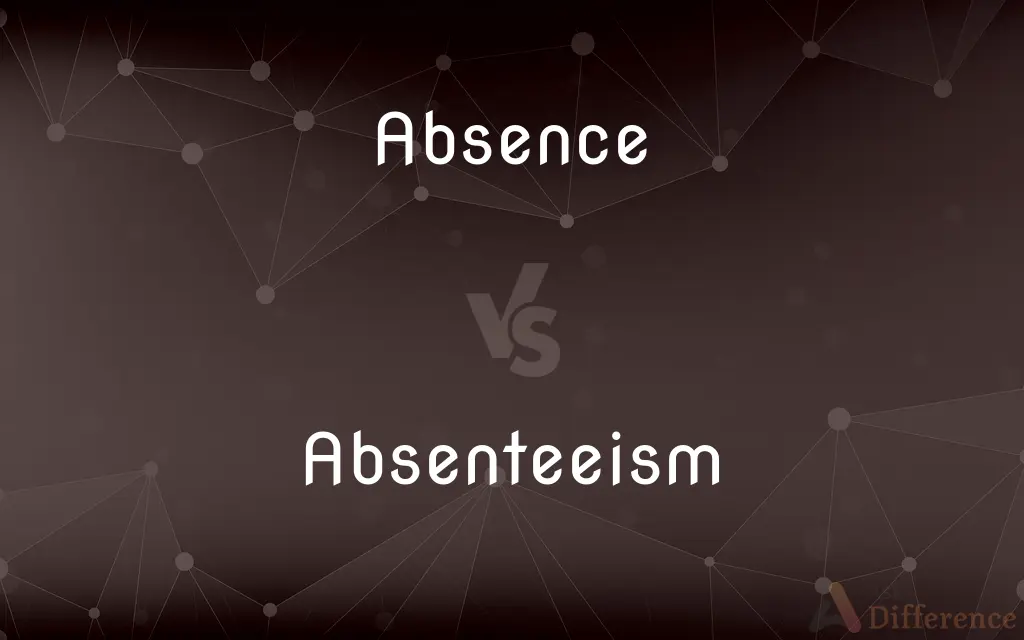Absence vs. Absenteeism — What's the Difference?
Edited by Tayyaba Rehman — By Fiza Rafique — Updated on March 19, 2024
Absence refers to the state of being away, while absenteeism denotes a habitual pattern of being absent, often without good reason.

Difference Between Absence and Absenteeism
Table of Contents
ADVERTISEMENT
Key Differences
Absence is simply the state or condition of being not present at a location where one is expected to be, such as at work, school, or in a relationship. It can occur for a variety of reasons, ranging from illness to personal commitments. On the other hand, absenteeism refers to the habitual non-presence of an individual from their regular duties or obligations without valid justification. It is often seen as a pattern or behavior rather than isolated incidents.
While an absence might be a one-time or occasional event, explained and justified by circumstances, absenteeism implies a regular and persistent failure to attend. For example, taking a day off work due to sickness represents an absence, whereas frequently missing work without good reasons is considered absenteeism.
In the workplace, absence can be planned or unplanned but is generally understood and accommodated within organizational policies. Absenteeism, however, poses challenges to productivity, workflow, and team dynamics, leading to potential disciplinary action. It is often addressed in HR policies and can be a sign of deeper issues such as job dissatisfaction, personal problems, or health issues.
In educational settings, a student's absence may be excused for reasons like illness or family emergencies, reflecting temporary disruptions. Contrastingly, chronic absenteeism indicates a student consistently missing school, which can affect their academic performance, social development, and future opportunities. Educational institutions monitor absenteeism closely due to its impact on student success.
The response to absence and absenteeism differs significantly. While organizations and institutions may offer support or accommodations for occasional absences, they typically develop strategies to mitigate absenteeism. This may include counseling, adjustments to work or study conditions, or interventions to address underlying causes.
ADVERTISEMENT
Comparison Chart
Definition
The state of being away.
Habitual pattern of being absent.
Frequency
Occasional, can be justified.
Regular and habitual.
Impact
Generally minimal and manageable.
Potentially significant.
Perception
Usually neutral or understandable.
Often viewed negatively.
Organizational Response
Supportive or accommodative.
May involve disciplinary action.
Compare with Definitions
Absence
Typically minimal if infrequent.
A single day of absence doesn't significantly affect project timelines.
Absenteeism
Often lacks a valid justification.
Frequent absenteeism without a medical or personal reason is problematic.
Absence
Not being present at a place where one is expected.
Her absence from the meeting was due to a doctor's appointment.
Absenteeism
Requires intervention and may lead to disciplinary actions.
The company is addressing his absenteeism through a performance improvement plan.
Absence
Seen as part of normal life circumstances.
Occasional absences are understood and accommodated by employers.
Absenteeism
Can lead to significant disruptions and consequences.
Her absenteeism has affected the team's productivity and morale.
Absence
Often managed through policies or prior notifications.
She informed her team about her absence next week due to travel.
Absenteeism
Regular and habitual absence from one's duties.
His absenteeism has been noted as a concern by his supervisor.
Absence
Can be justified by personal or medical reasons.
His absence was excused due to a family emergency.
Absenteeism
Generally viewed negatively and as a behavioral issue.
Chronic absenteeism is seen as a lack of commitment or professionalism.
Absence
The state of being away from a place or person
The letter had arrived during his absence
I supervised the rehearsal in the absence of the director
Absenteeism
Absenteeism is a habitual pattern of absence from a duty or obligation without good reason. Generally, absenteeism is unplanned absences.
Absence
The state of being away.
Absenteeism
Habitual failure to appear, especially for work or other regular duty.
Absence
The time during which one is away.
Absenteeism
The rate of occurrence of habitual absence from work or duty.
Absence
Lack; want
An absence of leadership.
Absenteeism
The state of being absent, especially frequently or without good reason; the practice of an absentee.
Absence
The state of being absent-minded; inattentiveness
Absence of mind.
Absenteeism
The practice of absenting oneself from the country or district where one's estate is situated.
Absence
A state of being away or withdrawn from a place or from companionship
Absence makes the heart grow fonder.
Absenteeism
The state or practice of an absentee; esp. the practice of absenting one's self from the country or district where one's estate is situated.
Absence
The period of someone being away.
During Jane's absence, Mark will be taking charge.
Absenteeism
Habitual absence from work
Absence
Failure to be present where one is expected, wanted, or needed; nonattendance; deficiency.
Absence
Lack; deficiency; nonexistence.
He had an absence of enthusiasm.
Absence
Inattention to things present; abstraction (of mind).
Absence of mind
Absence
(medical) Temporary loss or disruption of consciousness, with sudden onset and recovery, and common in epilepsy.
Absence
(fencing) Lack of contact between blades.
Absence
A state of being absent or withdrawn from a place or from companionship; - opposed to presence.
Not as in my presence only, but now much more in my absence.
Absence
Want; destitution; withdrawal.
Absence
Inattention to things present; abstraction (of mind); as, absence of mind.
To conquer that abstraction which is called absence.
Absence
The state of being absent;
He was surprised by the absence of any explanation
Absence
Failure to be present
Absence
The time interval during which something or somebody is away;
He visited during my absence
Absence
Epilepsy characterized by paroxysmal attacks of brief clouding of consciousness (a possible other abnormalities)
Common Curiosities
How do employers typically handle absences?
Employers may handle absences by requiring notification or proof (like a doctor's note), depending on the reason and frequency.
What is absenteeism?
Absenteeism is the frequent or habitual failure to be present at one's place of duty or obligation, often without good reason.
Can absenteeism affect job security?
Yes, chronic absenteeism can negatively impact job security, leading to disciplinary actions or even termination.
Is all absenteeism unjustified?
Not all absenteeism is unjustified; some may stem from unresolved personal or health issues, requiring understanding and support.
Does absenteeism only apply to work?
No, absenteeism can apply to any regular commitment, including educational settings, where it impacts attendance and performance.
What constitutes an absence?
An absence is a situation where an individual is not present where they are expected to be, such as at work or school, for any reason.
When does absence turn into absenteeism?
Absence turns into absenteeism when it becomes a regular pattern, especially if it's without valid reasons and impacts responsibilities.
What's the difference between leave and absenteeism?
Leave is usually planned and approved absence, whereas absenteeism is often unplanned and without approval.
Can mental health issues lead to absenteeism?
Yes, mental health issues can lead to absenteeism, highlighting the need for supportive workplace and school policies.
Is absenteeism always the individual's fault?
Absenteeism is not always the individual's fault; it can be a sign of deeper issues that require understanding and intervention.
How does absenteeism affect teamwork?
Absenteeism can disrupt teamwork, affecting morale and productivity by increasing the workload on other team members.
How can absenteeism be reduced in the workplace?
Absenteeism can be reduced through positive work environments, addressing employee concerns, and providing support for personal and health issues.
How do schools handle chronic absenteeism?
Schools may handle chronic absenteeism through interventions, support services, and working closely with families to address underlying issues.
Are there legal consequences for excessive absenteeism?
In some cases, excessive absenteeism can lead to legal consequences, especially if it breaches employment contracts.
Can remote work reduce absenteeism?
Remote work can reduce absenteeism by offering flexibility and addressing some of the barriers to attendance, such as commuting issues.
Share Your Discovery

Previous Comparison
Military vs. Paramilitary
Next Comparison
Reptile vs. AmphibianAuthor Spotlight
Written by
Fiza RafiqueFiza Rafique is a skilled content writer at AskDifference.com, where she meticulously refines and enhances written pieces. Drawing from her vast editorial expertise, Fiza ensures clarity, accuracy, and precision in every article. Passionate about language, she continually seeks to elevate the quality of content for readers worldwide.
Edited by
Tayyaba RehmanTayyaba Rehman is a distinguished writer, currently serving as a primary contributor to askdifference.com. As a researcher in semantics and etymology, Tayyaba's passion for the complexity of languages and their distinctions has found a perfect home on the platform. Tayyaba delves into the intricacies of language, distinguishing between commonly confused words and phrases, thereby providing clarity for readers worldwide.
















































